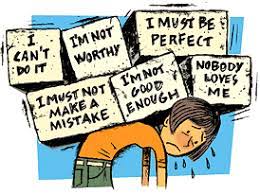Original content by Ashley Berges

Do you know what self-sabotage is, and if you do, is it normal to self-sabotage?
Self-sabotage is when we undermine ourselves. It is when we make choices, even if it is choosing something that is not necessarily good for us. Whatever we chose ends up destroying us physically, emotionally, or spiritually. We deliberately thwart ourselves in our successes and effort.
Self-sabotage comes in two forms. The conscious form is where we are aware of what we are doing, as well as the unconscious form where we do not realize it is happening.
Self-sabotage can be very normal for many of us. There is a difference between being normal and being healthy. We are trying to become healthier in our day-to-day life. We need to be healthier in the way that we treat ourselves, mentally, emotionally, and spiritually.
Let’s look at why we self-sabotage. Self-sabotage is based on our core beliefs. Some examples of core beliefs are: I am smart, I am stupid, I am lovable, and I am unlovable. These core beliefs create our reality. Therefore, this allows us to do things or not do things in our lives.
We do valuable things in our lives but sometimes the core beliefs get in the way of us seeing our value. They cause us to feel bad for ourselves and be very hard on ourselves. As a result, we make some self-sabotaging choices because we do not believe in our value. Furthermore, we don’t believe we deserve good things, or that we will never be successful enough to have a great job or get have a successful career.
We put the core beliefs in the process of hurting ourselves which ultimately self-sabotages us by our choices.

Self-sabotage comes in many forms. One type of self-sabotage is procrastination. Sometimes we procrastinate out of fear. It may be the fear of succeeding, fear of the unknown, and fear of failure. There are a lot of things that make us put something off, or procrastinate, that we could get done today. It appears it is the things we don’t like that we tend to procrastinate the most.
Often, we procrastinate because we are perfectionists. As perfectionists, we want to be perfect and if it is not perfect then we procrastinate on getting it done. We hold things up to an impossible standard. Consequently, everything must be perfect and ultimately; it does not get done.
Perfectionism is most likely something that we learned in our childhood, another core belief. Perfectionism is often our way of controlling things. It’s holding something at a very high standard. Growing up we felt that we had to be perfect. Hence, procrastination holds us back from ever materializing what we need.

Another form of self-sabotage is self-medicating. Many of us self-medicate whether it’s alcohol, drugs, sex, or gambling. Most often we see it around drugs and alcohol. They are used to numb ourselves or quiet the voice in our heads. These things prevent us from being on top of our game. This can be one of the biggest forms of self-sabotage that a lot of people do.
Most likely it is an act of unconscious self-sabotage. Usually, it happens right before we finally reach our goal. We are fearful and go out and do something such as drink too much which influences attaining our goal. We self-sabotage the outcome.
Self-sabotage is very interesting. We need to think, are there places in our lives where we are hurting ourselves? It does not have to be drugs or alcohol; it could be the people we surround ourselves with. These people, instead of helping us, could be hurting us. We may need to look at our friends or love interests and ask ourselves if they are good for us. We may not be self-sabotaging ourselves directly with these people, but we have appointed someone to do it for us. We could be with someone who is supposed
to be our “best Friend,” but is not necessarily our “best friend.” Everything they do is antithetical to our values. Sometimes when we are in a relationship where we give into something that we probably should not, that goes against our values, that is self-sabotage. Afterward, we feel bad and become sad and resentful and turn it in on ourselves, this created internal self-sabotage.
There are multiple levels of self-sabotage. The first thing we need to know is if we are participating in self-sabotage.
Watch the entire video here:







